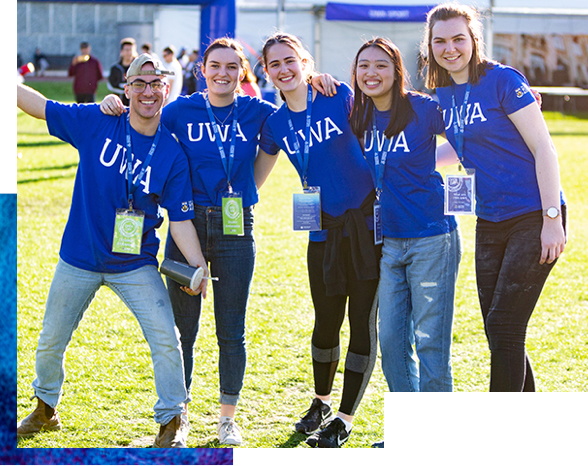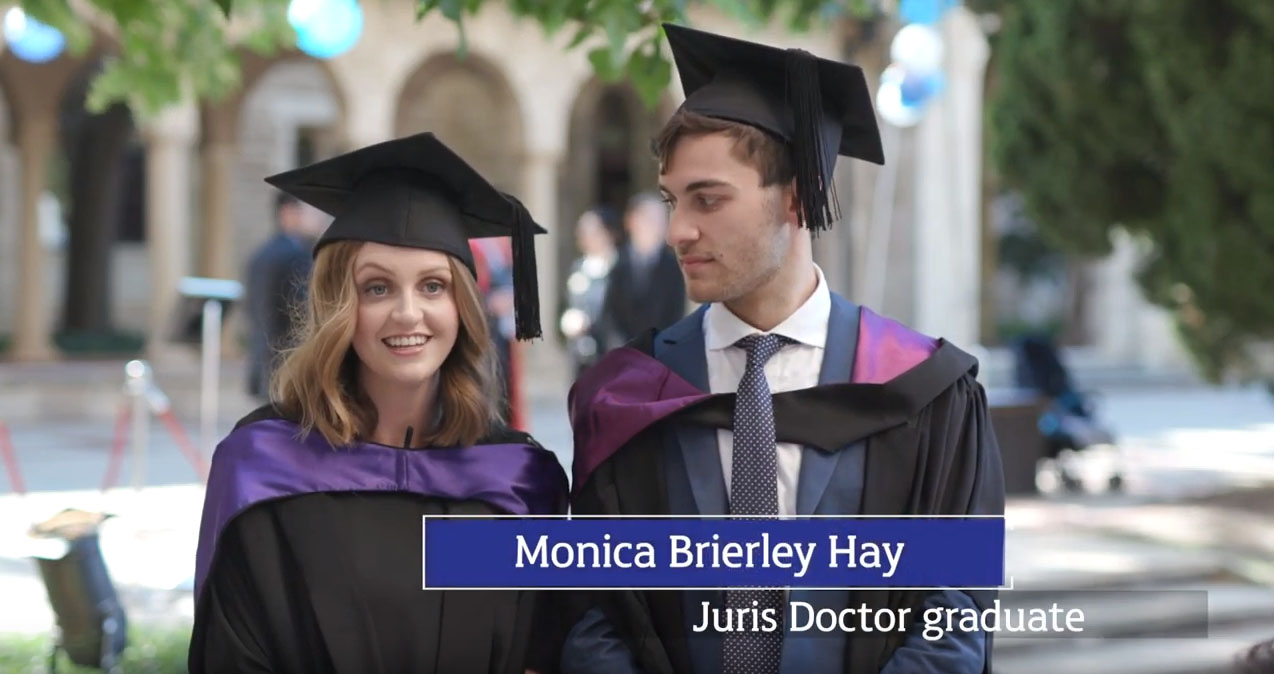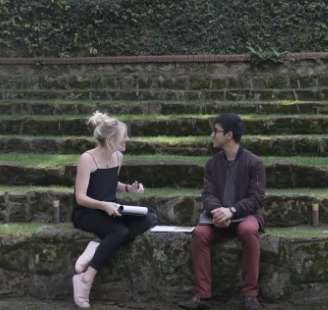Postgraduate
Graduate Diploma in Law
Contact us
Address
Student Central
The University of Western Australia (M355), 35 Stirling Highway, Perth, Western Australia 6009
Telephone
131 UWA (131 892)
International
(+61 8) 6488 1000
Hours
Frequently asked questions
Events you may be interested in
Show more eventsCareers and further study
Explore the career opportunities available to you.
Career Pathways
Further study opportunities
After completion of the Graduate Diploma in Law, you may wish to enrol in:
- Master of Laws
- Master of Public Policy
- Master in International Law
- Master of Taxation Law
- Master of Mining and Energy Law
- Master of Resources and International Commercial Law
Six surprising job opportunities our alumni got with a law degree

From joining legal practices around the world and shaping policy nationally, to becoming educators and starting up businesses to address global challenges, our law graduates go places.
We caught up with six alumni to hear where their law degrees have taken them.
Fees and scholarships
Learn more about the fees that apply to you for this course.
Domestic Student Fees
For Full-Fee Paying places, students are charged an annual course fee, charged per credit point at a rate dependent on the course in which the student is enrolled. Annual course fees are calculated based on a standard annual study load of 48 credit points (1.0 EFTSL).
Check the handbook to confirm the annual study load for your course.
Visit the Fee Calculator and select your course type to find out more. Fees are subject to annual indexation.
More information on how fees are calculated.
Scholarships
Scholarships are available to students from a diverse range of backgrounds, including academic achievement, financial need, educational disadvantage, leadership and community service, artistic or sporting achievements, and being from a rural or remote area.
Cost of living
International Student Fees
There is no current fee information available for this course. Please visit the fee calculator to browse course fees from a previous year, or other courses.
Scholarships
Scholarships are available to students from a diverse range of backgrounds, including academic achievement, financial need, educational disadvantage, leadership and community service, artistic or sporting achievements, and being from a rural or remote area.
Cost of living
Admission requirements
If you’re interested in furthering your career by studying this postgraduate course, find out the admission details below
Admission Requirements
2(a) (i) a bachelor's degree in a cognate area, or an equivalent qualification, as recognised by UWA; and (ii) the equivalent of a UWA weighted average mark of at least 50 per cent; or
3(a) (i) a bachelor's degree, or an equivalent qualification, as recognised by UWA; and (ii) the equivalent of a UWA weighted average mark of at least 50 per cent; and (iii) at least two years of relevant professional experience.
Ranking and Selection Process
English competency
English is the language of instruction and assessment at UWA and you will need to meet the English language requirements of the University to be eligible for a place.
This course has higher ELC requirements. Applicants presenting with the IELTS Academic require an overall score of at least 7.0 and no band less than 6.5. For more information visit ELC requirements.
How to apply

Ready for the next step?
Find out how to apply through our simple online application process.
We'll guide you through our entry requirements, admission pathways available to you and application deadlines for your chosen course.
We can’t wait for you to join us!
Course details
About the course
This course is designed to equip practising lawyers and law graduates with an advanced understanding of the law to meet the challenges of the dynamic workplace. You'll learn from world-class teaching staff and study with the next generation of leaders in legal practice, government, business and the not-for-profit sector.
Quick details
- Available
- Perth (Crawley campus)
- Full-time
- Part-time
- On-campus
- Applications are accepted throughout the year.
- Variable - includes intensive teaching blocks
- Postgraduate
- 20320
- 026880D
Coordinator Dr Marilyn Bromberg

Originally from Canada, Dr Marilyn Bromberg graduated with a BBA (Honours) from the Schulich School of Business at York University, an LLB (Dist) from The University of Western Australia, a PhD from Murdoch University and a Graduate Certificate in University Teaching from The University of Notre Dame Australia (Fremantle Campus).
Alongside teaching in the units Social Media and the Law, Professional Practice and Procedure, Marilyn works as a lawyer at the Fremantle Community Legal Centre and as a consultant in her research areas for legal organisations.
Course structure
Postgraduate coursework degrees and combined (coursework and research) degrees comprise a number of units. Refer to the course structure for more information.
Why study this course?
- You can choose a specialised area or broaden your knowledge across a range of subjects including commercial law, government regulation, resources law, and a wide variety of public and private international law areas.
- You'll gain advanced reasoning skills, develop knowledge and research skills.
- You can enhance and update your existing legal qualifications.
- It’s all electives in law – you'll choose all the units to take!
Western Australia's premier Law School
The UWA Law School is ranked in the top 150 law schools in the world for Law and Legal Studies (QS 2025). You will join and contribute to 90 years of excellence: we are the first law school established in WA and the fifth oldest in Australia.
Our graduates include a Prime Minister, a Governor of Western Australia, State Ministers, Justices of the Supreme Court of WA, a Young Australian of the Year, Rhodes Scholars, and more.
While we have a long and proud history, we're also a closely-knit, creative and progressive Law School, fostering critical thought, ethical scholarship and practice, a deep connection to our Indigenous past and present, and supportive student culture based upon wellbeing and inclusion.
Flexibility
We understand that life is busy. That's why our postgraduate courses are designed so you can balance your work and studies. Our flexible postgraduate experience includes the opportunity to study part time, a range of units that are taught after hours, and the option to learn via intensive units. Ask our Student Central team for advice on choosing the right postgraduate route for you. Find out more here.
You'll learn to
You'll develop expert, specialised cognitive and technical legal skills, which will vary depending on your unit choices. This will allow you to independently:
- analyse critically, reflect on and synthesise complex information, problems, concepts and theories as developed in seminars and through your independent research essays.
- research and apply established theories to a body of knowledge or practice.
- interpret and transmit knowledge, skills and ideas to specialist and non-specialist audiences.
Graduate outcomes
Students will have an in-depth understanding of advanced complexities and challenges of a variety of legal topics. They will be able to adapt the degree to their own specialisation, given free choice to extend their basic legal knowledge in the subjects open to them, thus utilising the degree to tailor their specialised knowledge as they wish. All units will ensure that students will have learned independent study and research, as well as critical legal analysis. They will have worked independently on research essays and tasks, and gained working knowledge of legal method and legal research principles alongside their specialised legal knowledge.
Students will develop expert, specialised cognitive and technical legal skills, which will vary depending on their unit choices. This will allow them to independently:
- analyse critically, reflect on and synthesise complex information, problems, concepts and theories as developed in seminars and through their independent research essays.
- research and apply established theories to a body of knowledge or practice.
- interpret and transmit knowledge, skills and ideas to specialist and non-specialist audiences.



